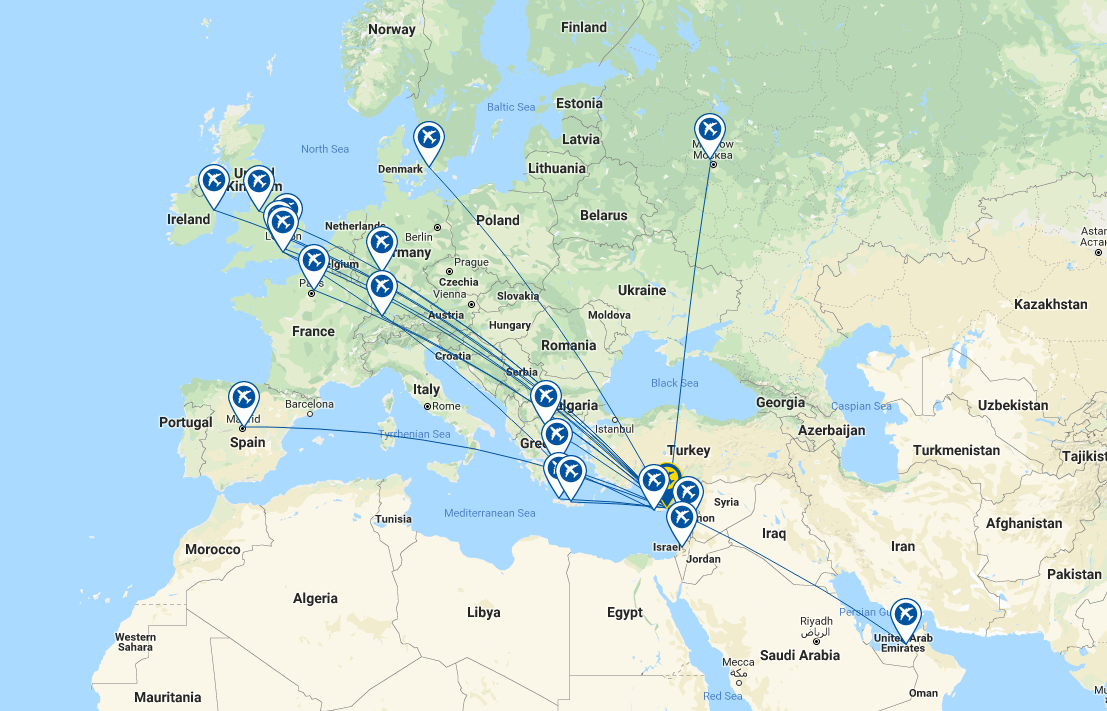The initial foundations of the model are being put in place with the implementation to Sabre's passenger reservations system to support its distribution and generate additional revenue through an increased sale of fares and new ancillary services. "We are a young and ambitious airline that is now equipped to compete with some of the largest carriers in Europe and the Middle East, which we expect to increase our market share and lead to an exciting future," says Andrew Madar, CEO, Cobalt Air.
The airline has now become the sole Cypriot airline to be a member of the International Air Transport Association (IATA) and in the first week of the new summer 2018 schedule has already added two milestones - the resumption of flights between Larnaca and London Heathrow by a Cypriot operator and the launch of its first route not touching the Mediterranean island between Athens and London Gatwick.
MAP - The Cobalt Air network spreads across Europe and the Middle East, but could extend further afield as early as this year as it studies long-haul operations Source: CAPA - Centre for Aviation and OAG
Source: CAPA - Centre for Aviation and OAG
The London Heathrow route is a key part of its strategy to feed traffic via Larnaca to other parts of its network and it has already identified the London - Abu Dhabi market as a city pair with good potential thanks to its scheduling. It is already seeing encouraging flows from its existing European network via Larnaca to the likes of Beirut and Tel Aviv.
Speaking to The Blue Swan Daily at the London Heathrow launch, Paul Simmons, commercial director, Cobalt Air, confirmed that the airline is already seeing "a reasonable yield differentiation" at the international hub compared to its flights into Gatwick and Stansted due to the "slightly higher passenger demographic". While the airline expects mainly point-to-point flows it sees "a large minority" of passengers connecting. "This will be in the 10s, 20s, 30s, even 40 percents rather than just ones or twos," said Mr Simmons.
Alongside the London Heathrow launch, Cobalt Air has added flights between Larnaca and Copenhagen this summer and Dusseldorf will join its network from next month boosting its network to 21 destinations across 12 countries. The summer growth has been delivered through the better utilisation of the airline's fleet of A320 Family aircraft and the return of one unit from an ACMI contract with Thomas Cook Airlines.
TABLE - From launching with just a single dry leased Airbus A320 and a number of Aircraft, Crew, Maintenance and Insurance (ACMI) leases, Cobalt Air has now grown to a fleet of six aircraft Source: CAPA - Centre for Aviation Fleet Database
Source: CAPA - Centre for Aviation Fleet Database
The fleet currently consists of two A319s and four A320s and Mr Simmons sees the A320 as the right-sized aircraft for its market, although an upgauge to the A321 is a possibility. "I wouldn't rule it out," he said. The CAPA - Centre for Aviation Fleet Database highlights that the aircraft are all leased, have an average age of over 13 years and have differing powerplants that will be complicating and adding costs to the operation and some form of fleet standardisation would certainly be a logical move as the airline grows.
Unlike the increasing industry tradition to pack the aircraft to maximum capacity, Cobalt Air is working to provide a premium offering that will deliver "a tangible product differentiation" versus rivals. A true business class experience is offered with a 2 by 2 configuration and a high service level. The airline is currently using price as a tactic to attract customers to the product as part of a "putting the customer first" strategy, according to Mr Simmons.
Alongside its European and Middle East offering, Cobalt Air continues to study expanding into long-haul markets with a small fleet of A330s. Although a 2018 launch date had previously been suggested, Mr Simmons said the project is "still in the evaluation mode," but confirmed that China, India, South Africa and USA were all country markets with potential.
While this may seem a little ambitious for a young airline, to replace a strong brand such as Cyprus Airways and build up an operation in a market already packed with LCCs and leisure specialists is no easy feat.
Looking ahead the airline's hub strategy - described as "a necessity" by Mr Simmons to balance seasonality issues and the small home population - will certainly mean a focus on building frequency in core markets, but new destinations in Germany and Scandinavia could be added alongside more points to the East across the Middle East.
Cobalt Air was recognised in last year's CAPA - Centre for Aviation Awards for Excellence as the Airline Start-Up of the Year, rewarded for its activity over the first year of its operations and for its innovation and impact on the industry since its launch.